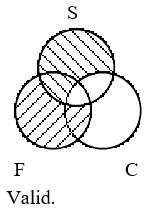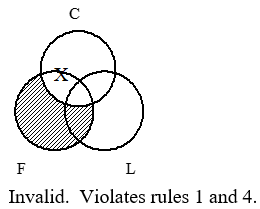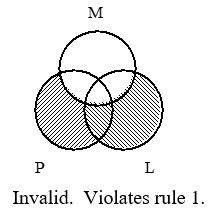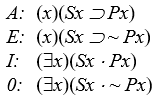Exam 14: Syllogistic Logic
Exam 1: Introduction10 Questions
Exam 2: Symbolizing in Sentential Logic24 Questions
Exam 3: Truth Tables27 Questions
Exam 4: Proofs Without CP or IP9 Questions
Exam 5: Proofs With CP or IP12 Questions
Exam 6: Sentential Logic Truth Trees8 Questions
Exam 7: Predicate Logic Symbolization29 Questions
Exam 8: Predicate Logic Semantics9 Questions
Exam 9: Predicate Logic Proofs8 Questions
Exam 10: Relational Predicate Logic38 Questions
Exam 11: Quantifier Rules Theory8 Questions
Exam 12: Predicate Logic Truth Trees8 Questions
Exam 13: Identity22 Questions
Exam 14: Syllogistic Logic32 Questions
Exam 15: Informal Fallacies10 Questions
Exam 16: Inductive Logic14 Questions
Exam 17: Axiom Systems11 Questions
Select questions type
Sorites.
Translate the following sorites into standard form and test for validity:
-No freshmen are nonstudents.
Some coeds are not ladies.
All noncoeds are nonstudents.
Some freshmen are ladies.
Free
(Short Answer)
4.8/5  (35)
(35)
Correct Answer:
All students are coeds.
All freshmen are students.
All freshman are coeds
 Some coeds are not ladies.
Some coeds are not ladies.
All freshman are coeds.
Some freshmen are ladies.

True-False
-The subject term of "All scientists are philosophers" is not distributed.
Free
(True/False)
4.8/5  (34)
(34)
Correct Answer:
False
Syllogisms
Put the following into standard syllogistic form and test for validity, using either the five rules for valid syllogism or Venn diagrams:
-All nonlogicians are nonphilosophers, because all logicians are mathematicians, while no philosophers are nonmathematicians.
Free
(Short Answer)
4.9/5  (41)
(41)
Correct Answer:
1. All logicians are mathematicians.
2. All philosophers are mathematicians.
3. All philosophers are logicians.

Multiple choice:
Assume existential import
-The contrapositive of "No scientists are nonphilosophers" is:
(Multiple Choice)
4.9/5  (37)
(37)
True-False
-We can validly infer from "Some scientists are not philosophers" to its obverse.
(True/False)
4.8/5  (41)
(41)
Multiple choice:
Assume existential import
-The proposition "Some scientists are not philosophers" follows from:
(Multiple Choice)
4.9/5  (41)
(41)
General Theory
-Assume for the moment (whether it actually is the case or not) that the four types of categorical propositions are adequately represented by the four formulas below, and show (a) why A and E propositions will not have the properties that contraries are traditionally supposed to have; and (b) why I and O propositions will not have the properties that subcontraries are traditionally supposed to have.

(Short Answer)
4.9/5  (31)
(31)
True-False
-The predicate term of "Some scientists are not philosophers" is not distributed.
(True/False)
4.8/5  (41)
(41)
General Theory
-Prove that no valid syllogism in the second figure can have an affirmative conclusion.
(Short Answer)
4.8/5  (45)
(45)
General Theory
-Assuming existential import, explain what the differences are between (a) contradictories; (b) contraries; and (c) subcontraries.
(Short Answer)
4.9/5  (37)
(37)
Sorites.
Translate the following sorites into standard form and test for validity:
-Anyone who is a nonstudent ought to study logic.
There are some athletes who are nonstudents.
There are some studious types that ought to study logic.
There are some athletes who are studious.
(Short Answer)
5.0/5  (39)
(39)
True-False
-We can validly infer from "Some scientists are philosophers" to its contrapositive.
(True/False)
4.9/5  (35)
(35)
True-False
-"Some scientists are not philosophers" and "Some scientists are philosophers" are contradictories.
(True/False)
4.8/5  (29)
(29)
True-False
-We can validly infer from "No scientists are philosophers" to its obverse.
(True/False)
4.7/5  (32)
(32)
True-False
-We can validly infer from "All scientists are philosophers" to its contrapositive.
(True/False)
4.7/5  (40)
(40)
Inference:
Answer the following questions, not assuming existential import
-Suppose it is true that "Some logicians are not mathematicians." Then what can be said about the truth value of the following sentences?
a. Some mathematicians are not logicians
b. Some logicians are mathematicians
c. All logicians are mathematicians
d. No logicians are nonmathematicians
e. Some nonmathematicians are logicians
f. No logicians are mathematicians
g. Some nonmathematicians are not nonlogicians
h. Some logicians are nonmathematicians
(Short Answer)
4.8/5  (36)
(36)
Inference:
Answer the following questions, not assuming existential import
-Suppose it is true that "All logicians are mathematicians." Then what can be said about the truth values of the following:
a. Some logicians are not mathematicians
b. Some logicians are mathematicians
c. No logicians are nonmathematicians
d. All mathematicians are logicians
e. All nonmathematicians are nonlogicians
f. No logicians are mathematicians
g. Some nonmathematicians are logicians
h. Some logicians are nonmathematicians
(Short Answer)
4.8/5  (34)
(34)
Multiple choice:
Assume existential import
-The obverse of "No nonscientists are philosophers" is:
(Multiple Choice)
4.9/5  (32)
(32)
Syllogisms
Put the following into standard syllogistic form and test for validity, using either the five rules for valid syllogism or Venn diagrams:
-Some logicians are nonphilosophers, so some mathematicians are logicians, since all mathematicians are nonphilosophers.
(Short Answer)
4.8/5  (49)
(49)
True-False
-"Some scientists are not philosophers" and "All scientists are philosophers" are contradictories.
(True/False)
4.8/5  (31)
(31)
Showing 1 - 20 of 32
Filters
- Essay(0)
- Multiple Choice(0)
- Short Answer(0)
- True False(0)
- Matching(0)